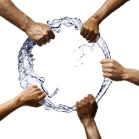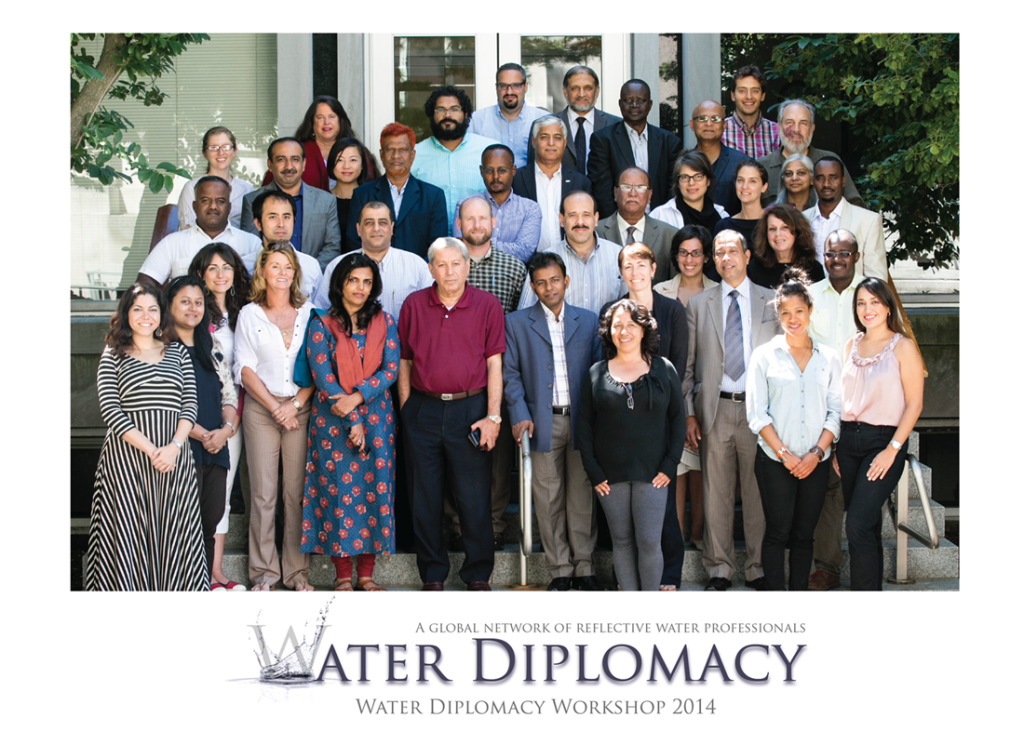
We recently completed our 4th Water Diplomacy Workshop (WDW) with 32 participants from 16 countries. We were fortunate to have a wonderful and diverse group of people eager to listen, learn and share. We originally designed this 5-day experience to provide a practical approach to synthesizing the theory and practice of water to create actionable knowledge.

Some of the feedback of the workshop that we’ve gotten so far from this group – “Fascinating and dynamic”; “Contents were eye-opener”; “Inspired new ways of looking at water issues”
We know this workshop experience is intense. Each morning, we start by presenting and discussing a real-world case study, followed by theoretical analysis and discussion of the challenges related to practical implementation of new problem solving approaches in our messy and complex real world. Afternoons are spent participating in a role play simulation where each participant adopts the role of stakeholder in a fictional transboundary water negotiation with elements and problems that are similar to those faced in many of the world’s transboundary basins. Given the long days and intense pres
entation schedule, debates and discussions, and the high energy required to participate in a realistic simulation, we were truly impressed by the energy, and passion expressed by Workshop participants.
People were willing to raise questions and press for answers if they didn’t get or didn’t agree with ideas we were presenting. Some people were appropriately skeptical where they didn’t see the relevance of the Water Diplomacy Framework (WDF) or didn’t agree with what they heard from us. Their questions and skepticism push us to continue to clarify and adapt our presentations to better demonstrate and describe our evolving framework.

Discussion, debate, and disagreements were an important part of the workshop experience. Photo: Alonso Nichols/ Tufts University
The energy and engagement during the multi-segment Indopotamia game was contagious. The discussion and debate during each daily session and the detailed debriefing and reflection after these sessions demonstrated the learning and growth occurring between exploring interests and building coalitions to the final negotiation for a formal agreement on water for the Indopotamia basin. The multi-day simulation game uses a stepwise approach to incorporate additional aspects of the WDF into each subsequent session. The daily debriefing process, including an internal highlight-reel video produced and edited daily by Bruno Verdini Trejo heightened each participant’s sense to prepare and be reflective about their role in Indopotamia and what they were learning about WDF. This video made the participants the stars of the week and was an exceptional learning and reflection tool for the participants, but also for both of us, as well. On the final day, when we used the Finn River exercise to present an opportunity for groups to practice leading their own debriefing, the growth and learning that occurred during the week was abundantly clear. We want to thank everyone who participated in the 2014 WDW for being so willing to throw themselves wholeheartedly into the discussions, debates, and role-play activities of the workshop. The openness, honesty, and willingness to commit themselves to participate fully in the workshop and its many experiences created something special at this year’s event.
Conversations on the dinner cruise on Tuesday evening – with the visual connection to Boston from the harbor – seemed to lower some people’s guard and encourage more personal exchanges. The spirit, fun and generosity of participants at the Harvard Faculty Club dinner celebration on Thursday was more joyful than anything we have experienced in past years during the WDW. Our thanks and gratitude to all participants for creating such a heartfelt evening for all of us!
Even the somewhat mundane certificate ceremony turned out to be relationship-building event! Participants all cheered for each other and they seemed to appreciate the diversity of participants and opportunity to remain connected as we grow our Water Diplomacy Network . We came away with a strong sense that some of the participants will really do what we hope they will do; that is, to implement Water Diplomacy Framework and teach others what they have earned to enhance water management practice with competing and conflicting needs and interests.
Each year, the workshop experience teaches us something new, but there are many people who have helped to add to what we are able to teach and share during the workshop week. Sharmila Murthy of Suffolk University, David Fairman of the Consensus Building Institute, and Alexandros Sarris from Harvard Law School added enormously to what we were able to present, expanding our discussion of international water law, management of large river basins and the new challenges for water governance in the Artic region and integrating these topics and ongoing initiatives with the Water Diplomacy Framework. Amanda Repella and Danya Rumore did a wonderful job of running the flawless logistics of too many moving parts. Our Teaching Assistants, Bruno Verdini Trejo of MIT, Michal Russo and Tania Alarcon of Tufts University, were so well-prepared, attentive, and helpful that the week ran flawlessly. Participant feedback was overwhelmingly positive about the logistics of the workshop. Hopefully, we are practicing what we are preaching and perfecting our approach to collaborative adaptive management of a complex system!
In four years of the Water Diplomacy Workshop, we have had over 100 participants from 40 countries. Let us keep connected and together, our WDW alumni, colleagues, and friends can collaboratively build a global network of reflective water professionals. We hope to learn and adapt from this year’s experience as we plan for WDW 2015, scheduled for June 22-26, 2015. Please spread the word and help us recruit the 5th cohort!
As a reminder, WDW alums are invited to register and participate in our invite-only private Water Diplomacy website. Workshop training materials and some photographs from the workshop are available for download.



